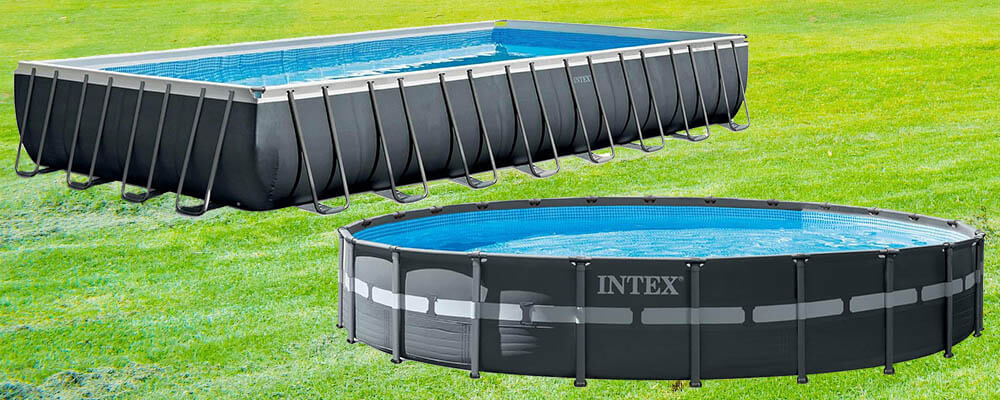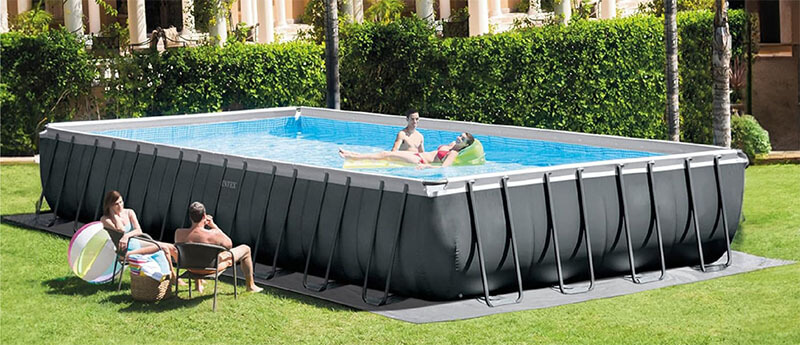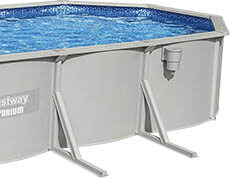
Round vs Rectangular Above Ground Pool
When you’re looking to transform your backyard into a personal oasis with an above ground pool, one of the first decisions you’ll face is choosing the shape of the pool.
What to look for? Consider how each shape fits with your space, your budget, and how you plan to use the pool.
Whether it’s round or rectangular, each shape offers distinct advantages and potential drawbacks.
In this article, we’ll dive into the round vs. rectangular above ground pool debate to help you make an informed choice that suits your lifestyle and backyard layout.
By comparing these two popular shapes, we’ll explore aspects like installation, maintenance, cost, and usage to provide a clear picture of what you can expect from each. So, grab your swim gear, and let’s figure out which pool shape will be the centerpiece of your summer fun!
Side-by-side Comparison of Round vs Rectangular Above Ground Pool
Contents
- 1 Side-by-side Comparison of Round vs Rectangular Above Ground Pool
- 2 Key Considerations When Choosing Between Round and Rectangular Pools
- 3 Why is the Structural Strength of Round Pools Better Than Other Shapes?
- 4 Exploring Pool Shapes: Round, Rectangular, and Oval
- 5 What Shape of Above Ground Swimming Pool is Best for Your Home?
- 6 Final Thoughts
Here’s a detailed side-by-side comparison of Round vs Rectangular Above Ground Pool:
| Feature | Round Above Ground Pool | Rectangular Above Ground Pool |
| Shape Benefits | - Even pressure distribution reduces stress on the structure. - Lack of corners enhances structural integrity. | - Provides more space for laps and active swimming. - Fits well in narrow, elongated spaces. |
| Installation | - Generally easier and cheaper to install due to simpler design. - Fewer materials needed. | - Often more complex and costly to install due to additional supports needed. |
| Maintenance | - Easier maintenance because of the absence of corners. - Uniform shape simplifies cleaning. | - Corners can collect debris, making cleaning more challenging. - May require more meticulous maintenance. |
| Cost | - Typically less expensive upfront due to simpler construction and fewer materials. | - Can be more expensive due to more extensive support structures and larger size. |
| Aesthetic Appeal | - Provides a softer, more organic appearance in a garden setting. - Less formal, more leisure-oriented look. | - Offers a more traditional swimming pool appearance. - Can enhance a yard with a modern or structured layout. |
| Space Utilization | - Less efficient use of yard space due to circular footprint. - May not fit as well in rectangular or irregular-shaped yards. | - Efficient use of space, especially in narrow or long yards. - Better alignment with property lines. |
| Functionality | - Ideal for general leisure and family use. - Not suitable for laps or long swimming paths. | - Perfect for lap swimming and water games. - Better for fitness and training purposes. |
| Structural Strength | - Natural structural strength due to even force distribution. - Fewer points of potential failure. | - Requires more robust construction to handle corners and longer walls. - Higher risk of stress points. |
Pros and Cons of Round Above Ground Pool
Choosing a round above ground pool involves weighing its advantages and disadvantages to determine if it’s the best fit for your needs and space. Here’s a breakdown of the pros and cons:
| Pros | Cons |
| Cost-Effective | Space Utilization |
| Generally cheaper than other shapes due to simpler design and construction, leading to lower purchasing and installation costs. | May not use backyard space as efficiently as rectangular pools, potentially limiting placement options in rectangular or narrow yards. |
| Structural Integrity | Limited for Lap Swimming |
| Even distribution of water pressure reduces stress on the structure, enhancing durability and reducing maintenance issues. | Not ideal for lap swimming due to its shape, better suited for leisure activities. |
| Easier Maintenance | Aesthetic Limitations |
| No corners make cleaning easier and more effective, preventing debris accumulation. | Some may find the circular design less appealing or formal, possibly not aligning with certain landscaping styles. |
| Installation Simplicity | Size Limitations |
| Typically easier and quicker to install because of the uniform shape. | Round pools might offer less usable interior space compared to a similarly sized rectangular pool, affecting user capacity. |
| Safer Design | Fewer Customization Options |
| No sharp edges or corners, which decreases the risk of injuries, making it safer, especially for children. | Often available only in standard sizes and depths, providing fewer options for personalization and specific yard adaptations. |
This table provides a clear overview of the advantages and drawbacks of round above ground pools, helping you make a well-informed decision based on your priorities and the characteristics of your yard.
Pros and Cons of Rectangular Above Ground Pool
Rectangular above ground pools are a popular choice for many homeowners due to their traditional pool shape and versatility. Like any pool design, they have specific advantages and disadvantages. Here’s a detailed look at the pros and cons of rectangular above ground pools:
| Pros | Cons |
| Ideal for Lap Swimming | Complex Installation |
| Long, straight stretches perfect for laps and serious swimming exercises, appealing to fitness enthusiasts. | More complex structure requires additional supports, making installation more labor-intensive and costly. |
| Efficient Space Utilization | Maintenance Challenges |
| Fits well into many yard layouts, especially narrow or long spaces, utilizing the area efficiently. | Corners and longer lengths can collect debris and require more effort in cleaning and maintenance. |
| Traditional Aesthetic Appeal | Higher Initial Cost |
| Offers a classic pool appearance that can enhance the beauty and value of a property. | Typically more expensive than round pools due to the need for extra supports and materials. |
| Versatility in Use | Stress Points at Corners |
| Suitable for a variety of water games and activities, accommodating multiple swimmers at once. | Structural stress can accumulate at the corners, potentially leading to quicker wear and tear. |
| Maximizes Swim Area | Requires More Ground Preparation |
| The rectangular shape maximizes the usable swimming area, making it ideal for larger gatherings. | May require more extensive ground leveling and preparation due to its shape and size. |
These points highlight the practical considerations of choosing a rectangular above ground pool, emphasizing its suitability for active swimmers and families while also noting the potential higher costs and maintenance requirements. This information should help you decide if a rectangular pool is the right fit for your needs and backyard environment.
Key Considerations When Choosing Between Round and Rectangular Pools
When choosing between round and rectangular above ground pools, several key considerations will guide your decision. These factors include utility, space utilization, cost of ownership, and more. Let’s explore each to help you make an informed choice.
Structural Strength
The structural strength of round pools often stands out as superior when compared to other shapes, and there are some pretty neat science and engineering principles behind why that’s the case.
Here’s why round pools have superior structural strength compared to other shapes, especially rectangular ones:
- Water Pressure Distribution
- Arch Support
- No Weak Corners
Read more on “Why is the structural strength of round pools better than other shapes?” below.
Utility (How you’ll use the pool)
- Lap swimming: Rectangular pools are essential, providing long, straight stretches for exercise.
- Lounging, Games, General Fun: Round pools excel here, offering plenty of space for floating, playing, and relaxing.
- Combination: Consider a very large round pool if you want some lap swimming potential, even if not optimal.
Space Utilization
- Yard Size: Round pools offer the most swimming area per square foot of yard space, winning in tighter areas.
- Yard Shape: Round pools fit easier into irregular yards. Rectangular pools shine in longer, narrower yards or when positioned along a fence line.
Cost of Ownership
- Initial Purchase: Round pools are generally cheaper than comparably sized rectangular pools.
- Installation: Round pools are often more DIY-friendly, saving on professional installation costs. Rectangular pools usually require an installer.
- Materials: Fewer materials are required for round pool setup. They also tend to have fewer corners, which reduces the stress on the structure and potentially lowers long-term maintenance costs.
- Maintenance: Round pools may be slightly cheaper to maintain (chemicals, water circulation) due to their shape, but the difference is often minimal.
Other Factors

- Aesthetics: Do you prefer the natural, flowing look of a round pool or the clean, modern lines of a rectangular one? Round pools often blend easily into landscapes, creating a natural, organic look. Rectangular pools can provide a more formal appearance, aligning well with modern, structured garden layouts.
- Safety: Regardless of shape, above-ground pools always need safety features like secure fencing, removable ladders, and pool covers.
- Resale Value: While not the primary concern, both shapes hold value decently, but the pool’s condition matters more than the shape itself.
Decision Tip:
The best way to decide is to rank these factors in order of importance to you. For example:
- Lap Swimming
- Yard Size
This ranking would strongly favor a rectangular pool.
By considering these key aspects—utility, space utilization, cost, aesthetic impact, safety, and installation—you can better assess which pool shape, round or rectangular, will best meet your needs and enhance your home’s outdoor environment.
Why is the Structural Strength of Round Pools Better Than Other Shapes?
The structural strength of round pools often surpasses that of other shapes due to several inherent design advantages. Understanding why this is the case can help you make an informed decision when choosing the shape of your above ground pool.

1. Even Distribution of Pressure
The circular shape of round pools plays a crucial role in how water pressure is distributed along the walls. In round pools, the pressure exerted by the water is evenly distributed across the entire perimeter. This uniform distribution helps prevent any single part of the pool wall from bearing too much stress, which can reduce the likelihood of structural failure.
2. Lack of Corners
Round pools do not have corners, which are often the weak points in rectangular and other non-circular pools. Corners can be stress concentrators where the structural forces converge, making them more susceptible to damage under continuous stress. Without corners, round pools naturally avoid this problem, enhancing their overall durability.
3. Simpler Construction
The design of round pools is inherently simpler, which not only makes them easier and often cheaper to construct but also reduces the potential for errors during installation that could compromise the pool’s integrity. The simplicity of the design contributes to a more robust structure that is less likely to fail.

4. Self-Supporting Structure
A round pool’s design is self-supporting. The circular form helps to hold itself up under the weight of the water, reducing the need for additional support structures that might be required in pools with more complex shapes. This self-supporting nature means that the pool walls and frame can be less extensive and yet more effective.
5. Flexibility under Load
The flexibility of the pool’s structure also contributes to its strength. In a round pool, the walls can flex slightly to accommodate shifts in water load and ground movement, which might otherwise crack or damage a more rigid structure. This flexibility helps to dissipate the forces exerted on the pool rather than concentrating them in specific areas.
These factors combine to make round pools a reliable choice for those seeking durability and longevity in an above ground pool. The even distribution of pressure, absence of stress-concentrating corners, simpler construction, self-supporting design, and inherent flexibility all contribute to the superior structural strength of round pools compared to other shapes.
Exploring Pool Shapes: Round, Rectangular, and Oval
When choosing an above ground pool, the shape is a crucial factor that can influence everything from installation costs to how you’ll use the pool. Each shape offers unique benefits and comes with specific considerations.
For a complete guide on choosing the perfect pool shape, check out this article on above ground pool shapes and sizes.
Round Above Ground Pools
Round pools are popular due to their affordability and the structural benefits they offer. The circular design eliminates the need for additional support, which can reduce costs and complexity in installation. This shape is ideal for families looking for a cost-effective way to enjoy leisurely swimming and relaxation.
Rectangular Above Ground Pools
Rectangular pools excel in providing a more traditional swimming experience. They are perfect for lap swimming and water games, making them ideal for more active users or those with larger families. The straight edges and corners of rectangular pools asupportso lend themselves well to a variety of backyard layouts, offering efficient use of space.
Oval Above Ground Pools
While not as common or widely available as round or rectangular pools, oval pools offer a middle ground between the two. They require more structural support than round pools, which can increase their cost. However, they provide more length than round pools without requiring as much space as rectangular options. This makes them suitable for activities like laps and games, especially in yards where a rectangular pool might not fit.
Why are Oval Pools Less Common?
- Compromise without the Benefits: Oval pools attempt to combine the space efficiency of round pools with the lap-friendly aspects of rectangular ones. Unfortunately, they don’t truly excel at either task.
- Cost and complexity: Their shape requires similar support structures to rectangular pools, making them more expensive than round alternatives.
What Shape of Above Ground Swimming Pool is Best for Your Home?
Factors to Consider
The best shape of an above ground pool for your home depends entirely on these factors:
1. Available Space and Yard Layout
- Small or Irregular Yards: Round pools win here. They fit well into tighter spaces and can work with less perfectly square yard layouts.
- Narrower Yards: Consider a rectangular pool that runs along the length of the yard to maximize use of the space.
- Spacious Yards: Here you have the freedom to consider either round or rectangular, with more focus on the other factors below.
2. Your Primary Goal for the Pool
- Lap swimming and Exercise: Rectangular pools are essential due to their long, straight swimming lane.
- Games, Lounging, and General Fun: Round pools excel, offering plenty of area for floating, playing water games, and relaxing.
- A Bit of Both: If you want a bit of exercise potential but mostly fun, consider a large round pool where some lap swimming is possible, even if not perfectly optimal.
3. Budget
- Cost-Conscious: Round pools typically come out cheaper than rectangular ones of similar size. You get a larger pool for your money.
- Larger Budget: If you have more to spend, both shapes become more accessible.
4. Aesthetics
- Free-flowing, Natural Feel: Round pools offer a more relaxed, organic look in your yard.
- Modern, Structured Look: Rectangular pools offer clean lines and a more contemporary vibe.
5. Installation
- DIY Enthusiast: Round pools are generally easier to install on your own.
- Prefer Professional Installation: Rectangular pools often require more expertise for the added support structures.
Shapes for Your Home
1. Round Pools: Ideal for Smaller Spaces and Budgets
Round pools are typically more cost-effective and easier to install than other shapes. Their circular design evenly distributes pressure, which can reduce maintenance issues over time. If your yard is compact or you’re looking for a simple, budget-friendly option for leisure and relaxation, a round pool could be the best choice.
2. Rectangular Pools: Perfect for Laps and Large Families
If you’re interested in swimming laps or have a larger family, a rectangular pool might suit your needs better. These pools offer ample space for exercise and play, making them great for active swimmers. Rectangular pools also fit well in narrow, elongated yards and can add a traditional, elegant look to your home.
3. Oval Pools: A Versatile Compromise
Oval pools combine aspects of both round and rectangular shapes. They can be a good choice if you need more space for swimming than a round pool offers but don’t have the room for a rectangular pool. Oval pools require more complex support structures than round pools, which can make them slightly more expensive, but they are still less costly than rectangular pools.
4. Considerations for All Shapes
Regardless of shape, consider how the pool will integrate with your existing landscaping and outdoor living areas. Think about sun exposure, the proximity to trees (which can increase maintenance due to falling leaves), and how the pool’s placement will affect its usability and aesthetics.
Final Thoughts
Choosing between a round and rectangular above ground pool ultimately boils down to assessing your specific needs and backyard space.
Round pools are cost-effective, easier to maintain, and provide a safe and communal swimming environment, making them ideal for families and casual use.
In contrast, rectangular pools cater to those looking for more rigorous swimming activities like laps, offering a traditional look and efficient space utilization.
Consider what fits best with your lifestyle and backyard to ensure many seasons of refreshing and enjoyable swimming.

